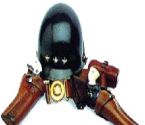Ironduke:
This is the FOURTH TIME I have asked for this information
Charles Whiting in "The battle of the Bulge".
"Indeed, Patton with three full divisions, one of them armoured, plus overwhelming air and artillery support at his disposal, was stopped by three inferior German divisions, one of which its commander (as we have seen) didn't even wish to take beyond the German border. He wasted his men's lives because he threw them into battle hastily and without enough planning, making up his strategy from day to day. Most important was that Patton, the armoured Commander, who should have known much better attacked on a 25 mile front across countryside that favoured defending infantry on account of its many natural defensive spots. Instead of a massed armour-infantry attack on some concentrated, ole blood and guts , the supposed dashing cavalry General, slogged away like some long in the tooth hidebound first world war infantry commander."
I had asked you for two things from Whiting:
1) The references/sources that Whiting uses for the above quote; and
2) References from Whiting's book "The Battle of the Bulge" in which he praises Patton.
That you have not provided these as requested can only mean:
a) Whiting in fact uses NO sources for the above quote - which makes him a sloppy "historian" (and I use the word historian lightly).
b) That nowhere in his book does Whiting praise Patton - which only confirms the one-sided view Whiting takes towards Patton, thus confirming my view that Whiting just wants to knock Patton with one-sided and unsubstantiated claims (ie no sources cited).
***********************************************************************
Here are some readers' reviews of some of Whiting's books:
The Other Battle of the Bulge: Operation Northwind (West Wall Series) > Customer Review #1:
--------------------------------------------------------------------------------
Thoughts on Whiting
Reading the other posts about this book compels me to say a few things about the author. Charles Whiting is a popular, readable and prolific writer of WWII stories, but he is not a historian in any way, shape or form. If you have read more than one of his books you will recognize the following:
1) lack of any kind of endnotes and few footnotes: where is this material coming from?
2) quotes from interviews with the author, which are not in any way anotated at the end of the book
3) praise of the common US soldier but uniformly harsh criticism of all senior U.S. leadership, especially Eisenhower
4) comparisons with Vietnam which, while occasionally interesting (he points out that William Westmorland fought in the Huertgen Forest without learning its lessons) usually border on the ridiculous
5) plagarism from his own works, including entire chapters, some of which have not even been re-written, but simply included whole in different books
6) where are the @and*#and! maps?
This book, like his "Ardennes: The Secret War" posits that Operation Nordwind was a bigger threat than the Battle of the Bulge to the Allies because it nearly defeated the Alliance politically at a time when they had already won the war militarily. It is an interesting conjecture, but it is tainted by the half-hidden glee that Whiting seems to feel over any disaster involving American troops and particularly their leadership. Everything he writes is written through that distoring lens. In any endeavour, if you want to find fault, you will, and in war this is particularly easy. Eisenhower was an armchair warrior and a true mediocrity as a strategist, but he was a superb military politician, maybe the only man who could have kept such a contentious alliance together until final victory. He deserves credit for holding it all together.
I have read five of Whitings books and found most of them to be very entertaining, especially because he tends to focus on American disasters which naturally have not gotten much press since the war, and thus have not been written about extensively. He puts books together like a novel, and is far from a dry writer. But his scholarship would not have met the standards of my high school history teacher, much less those of a true historian. He seems to write about what interest him only, is careless with his statistics and dates, includes facts that suit his opinions, states his opinions as facts, and constantly recycles his own material. You could probably file his books under historical fiction before you could file them under history."
*****************************************8
Whiting, Charles. The Battle for Twelveland: An Account of Anglo-American Intelligence Operations Within Nazi Germany, 1939-1945. London, Leo Cooper, 1975. The Spymasters: The True Story of Anglo-American Intelligence Operations Within Nazi Germany, 1939-1945. New York: Dutton, 1976.
Constantinides says this is "a potpourri of fact and fiction, actuality and myth, assumptions, sketchy versions of certain events, contrived tie-ins, and a certain confusion." Nevertheless, the author is "sometimes so accurate as to indicate access to well-informed sources or successful combining of certain versions." There is also "a good segment on SIS's role and the basis of its intelligence successes against Germany."
*************************************
Whiting, Charles. Gehlen: Germany's Master Spy. New York: Ballantine, 1972.
NameBase: "Charles Whiting's book is somewhat sensational in tone and doesn't cite sources.... There are altogether too many exclamation points, along with direct quotes that appear to be added for effect rather than accuracy. Most of the book concerns Gehlen's career in Germany, particularly after the war, rather than his associations with U.S. intelligence."
http://intellit.muskingum.edu/alpha_fol ... f-whz.html








